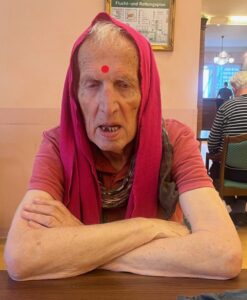Dementia results from a variety of diseases and injuries that affect the brain. It is currently the seventh leading cause of death. Currently more than 55 million people have dementia worldwide. Every year, there are nearly 10 million new cases.[1]
 This photo arrived today. It shows our older brother looking directly into what I suspect is a world beyond comprehension. He positioned the cloth on his head without prompting, writes our younger brother who took the photo. I’m struck by his presence: strong arms crossed, posture upright, face gaunt, tufts of white-blond hair, eyes focused on . . . what? I added the dot to his forehead as the mark of a holy man reverting to his original nature.
This photo arrived today. It shows our older brother looking directly into what I suspect is a world beyond comprehension. He positioned the cloth on his head without prompting, writes our younger brother who took the photo. I’m struck by his presence: strong arms crossed, posture upright, face gaunt, tufts of white-blond hair, eyes focused on . . . what? I added the dot to his forehead as the mark of a holy man reverting to his original nature.
“Like a tiny drop of dew, or a bubble floating in a stream; / Like a flash of lightning in a summer cloud, / Or a flickering lamp, an illusion, a phantom, or a dream. / So is all conditioned existence to be seen.” Thus spoke the Buddha.[2]
Ever since our last visit I’ve been wondering whether he might be suffering from being out of his mind (the linguistic root of the word dementia).[3] I wish I’d enquired about “what’s on your mind” or “how are you feeling” but, looking back, was primarily focused on being present with him and attending to his moment-by-moment needs.
“Suffering”, writes Arthur Frank, “involves experiencing yourself on the other side of life as it should be, and no thing, no material resource, can bridge that separation. Suffering is what lies beyond such help. Suffering is the unspeakable, as opposed to what can be spoken; it is what remains concealed, impossible to reveal; it remains in darkness, eluding illumination; and it is dread, beyond what is tangible even if hurtful. Suffering is loss, present or anticipated, and loss is another instance of no thing, an absence.”[4]
To my understanding, Frank’s “no thing” echoes the historical Buddha’s teaching on impermanence.[5] Perhaps there’s an eerie benefit to living with dementia: the freedom from ego-based notions. To cite an example: my hitherto eloquent brother would regularly come upon words he couldn’t retrieve. Instead of searching or apologizing, he’d briefly pause, say “Oh, well”, and proceed, seemingly untroubled.
♥ I bow in gratitude to my brother for helping me learn from his illness. ♥
.
[1] National Institute of Aging. [2] From the Diamond Sutra, ch. 32. ©2019 Alex Johnson. [3] from Latin dementia “madness, insanity,” literally “a being out of one’s mind.” Online Dictionary of Etymology. [4] Frank, A.W. (2001). Can we research suffering?. Qualitative health research, 11(3), 355. [5] Viparinama-dukkha, in: O’Brian, B. (2018). Learning religions.

Thank you. Daishin, for sharing this moving nsight. I feel myself taking it on board, noticing how it opens my view. Very thought provoking. My heart goes out to you and your brothers.
Thank you Peter’s brother for helping all of us learn from his illness. My heart joins yours Peter in sharing love and admiration for your dear sibling. Peace to all souls.
Thank you, Peter.
What a gift, these experiential teachings and the contemplations and insight that follow. Thank you for including us, dear Daishin brother.